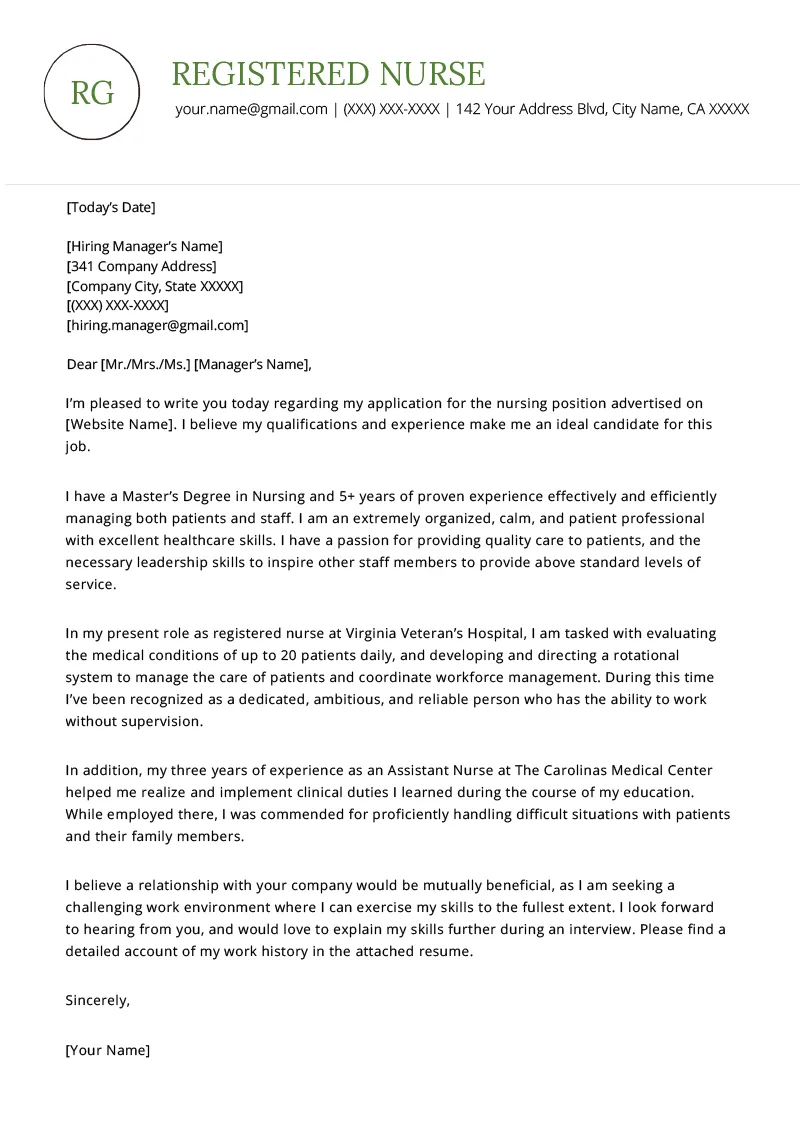Crafting Your Nursing Cover Letter
A nursing cover letter is your first impression. It’s your chance to showcase your personality and demonstrate how your skills and experience align with the specific requirements of a nursing position. A well-crafted cover letter can significantly increase your chances of landing an interview. It’s essential that your cover letter is tailored to each job you apply for. This demonstrates to the hiring manager that you have taken the time to understand their needs and are genuinely interested in the position. Generic cover letters are often overlooked, so personalize it for each application, highlighting the skills and experiences that best match the job description, making sure to include your name, address, phone number, and email address at the top of the letter.
Understanding the Purpose of a Cover Letter
The primary purpose of a cover letter is to introduce yourself and your resume to a potential employer. It provides context to your resume, explaining why you’re a good fit for the job and the organization. This is an opportunity to highlight your key skills, experience, and accomplishments, showcasing how they align with the employer’s needs. Furthermore, the cover letter provides a platform to demonstrate your communication skills, professionalism, and enthusiasm for the nursing profession. A cover letter can set you apart from other applicants by sharing your passion for patient care, your understanding of healthcare challenges, and your specific goals in your nursing career.
Highlighting Your Key Skills and Experience
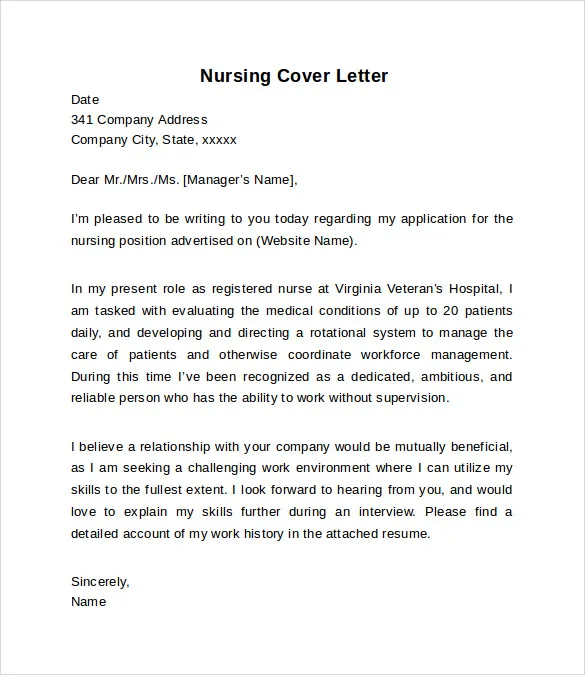
When writing your nursing cover letter, you should highlight the key skills and experience relevant to the position you are applying for. Review the job description carefully to identify the specific skills and qualifications the employer is seeking. Focus on providing concrete examples of your accomplishments, quantifying your achievements whenever possible. For instance, if the job posting mentions experience in a specific area of nursing or a particular skill, provide details on how you’ve demonstrated these skills in previous roles. This might include experience with electronic health records, patient assessments, medication administration, or emergency procedures. Use action verbs to effectively describe your contributions and the impact you had on patient care, quality of service, or team performance.
Researching the Healthcare Facility
Before you start writing your nursing cover letter, research the healthcare facility you are applying to. Understanding the facility’s mission, values, and the specific services it provides will help you tailor your letter and demonstrate your genuine interest. Visit the facility’s website to learn about its history, recent initiatives, and any special programs it offers. If possible, read reviews from patients or employees to gain insights into the facility’s culture. This research will help you align your cover letter with the facility’s needs and expectations, emphasizing how your skills and experience can contribute to their goals. Customizing your letter in this way shows that you have taken the time to understand the facility’s values and are enthusiastic about joining their team.
Cover Letter Examples for Different Nursing Roles
Registered Nurse (RN) Cover Letter
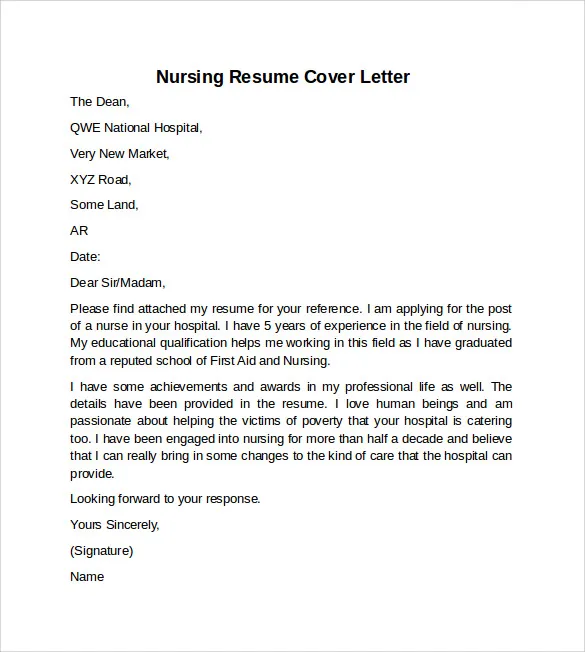
An RN cover letter should emphasize your ability to provide comprehensive patient care, assess patient conditions, administer medications, and collaborate with healthcare teams. Highlight your experience with patient education, documentation, and adherence to nursing standards. For example, you could mention experience with specific patient populations, like ICU, oncology, or pediatrics, and how you’ve managed complex cases. Use strong action verbs to describe your responsibilities and achievements in previous roles. If you have any certifications or specializations, like critical care nursing or wound care, make sure to mention them, as these increase your value to the employer.
Licensed Practical Nurse (LPN) Cover Letter
An LPN cover letter should showcase your skills in providing basic patient care, assisting RNs, and administering medications under supervision. Highlight your experience in taking vital signs, assisting with activities of daily living, and maintaining patient records. When tailoring your cover letter, focus on your abilities to work as part of a team and to follow instructions carefully. Provide specific examples of how you’ve contributed to patient care and well-being, and emphasize any specialized training or certifications you possess, such as IV therapy. Consider including details about your proficiency in electronic health records systems and your experience in ensuring patient comfort and safety.
Nurse Practitioner (NP) Cover Letter
A Nurse Practitioner cover letter should highlight your advanced practice skills, your ability to diagnose and treat patients, and your experience in a specific area of healthcare. Mention your prescribing authority, your experience with patient management, and your collaboration with other healthcare professionals. Emphasize any specializations you have, such as family practice, cardiology, or mental health. Be sure to demonstrate your commitment to providing quality, patient-centered care and your ability to work autonomously while adhering to ethical standards. When describing your experiences, be specific about the kinds of patients you have treated and the positive outcomes you have achieved.
Cover Letter Formatting and Style
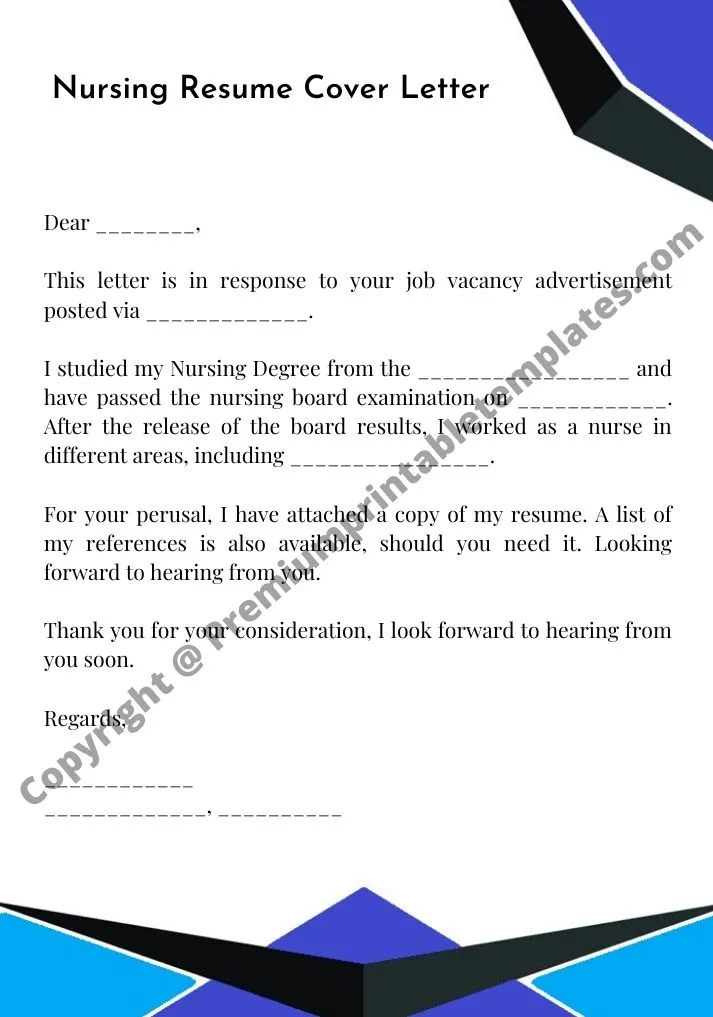
Choosing the Right Font and Layout
When it comes to formatting your nursing cover letter, it’s important to choose a clean, professional font and layout. Use a standard font like Times New Roman, Arial, or Calibri, with a font size between 10 and 12 points, ensuring readability. Make sure to use a layout that’s easy on the eyes, with adequate white space, clear headings, and bullet points to highlight key information. Keep your letter to one page to keep it concise. At the top of your letter, include your contact information (name, address, phone number, and email address), followed by the date, and the hiring manager’s name and contact information (if available). The layout should be simple, with clear sections for the introduction, body, and closing, making it easy for the reader to quickly find the information they need.
Addressing the Hiring Manager Correctly
Addressing the hiring manager correctly is a small but important detail that can leave a positive impression. Always try to find out the hiring manager’s name. If possible, call the facility’s HR department or check the company website to find out who the contact person is. If you can’t find a specific name, use a professional greeting such as “Dear Hiring Manager” or “Dear Nurse Hiring Committee.” Avoid vague greetings like “To Whom It May Concern,” which are impersonal and less effective. Be sure to spell the name correctly. This shows that you’ve taken the time to tailor your letter to the specific recipient, which indicates your attention to detail and respect for their time.
Proofreading Your Cover Letter
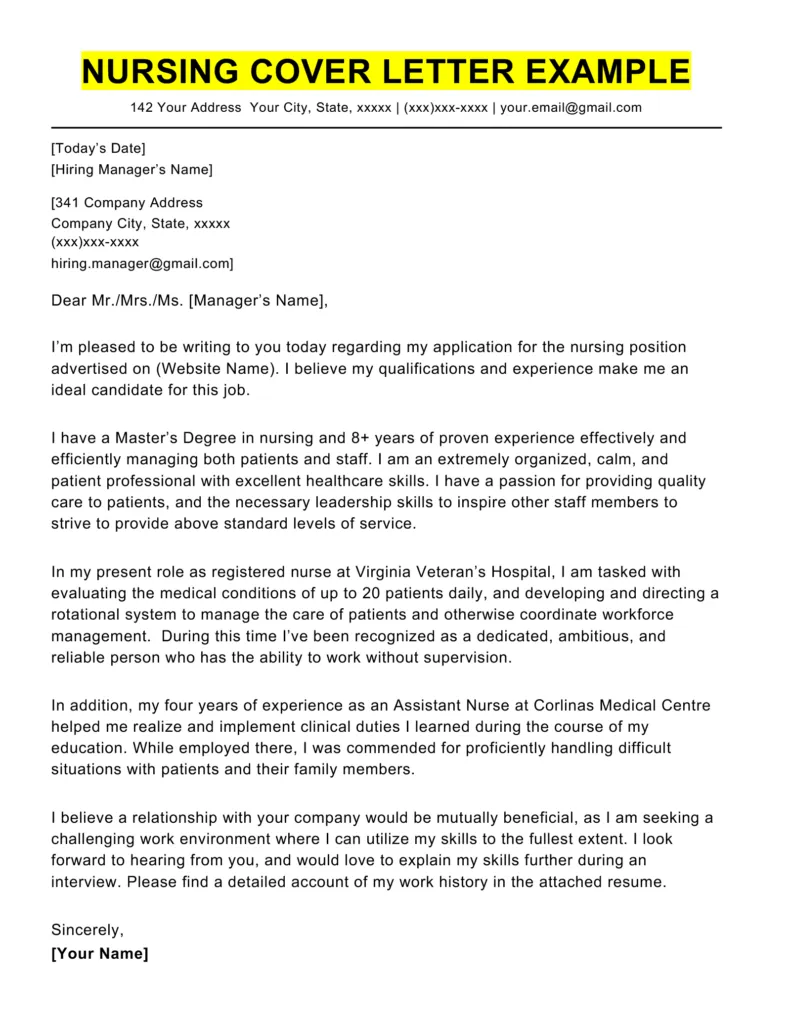
Before submitting your cover letter, proofread it carefully. Spelling and grammatical errors can create a negative impression and undermine your credibility. Check for any typos, incorrect punctuation, and formatting inconsistencies. It’s helpful to have another person read your letter to catch any errors you might have missed. Take your time to check the details, such as the facility’s name, job title, and contact information, to ensure accuracy. A well-proofread letter demonstrates professionalism and attention to detail. When you take the extra time to ensure that your writing is polished, this will greatly increase your chances of making a good impression and being considered for an interview.
Writing a Compelling Closing
Expressing Your Enthusiasm
In the closing paragraph of your nursing cover letter, express your enthusiasm for the position and the opportunity to contribute to the healthcare facility. Reiterate your interest in the role and the organization’s mission. Mention why you are excited about the position and what you hope to bring to the team. This is also the place to show your understanding of the challenges in the healthcare industry, and show that you are ready to use your experience to provide excellent patient care. Conclude with a strong statement that reinforces your qualifications and your desire to be considered for an interview.
Including Contact Information
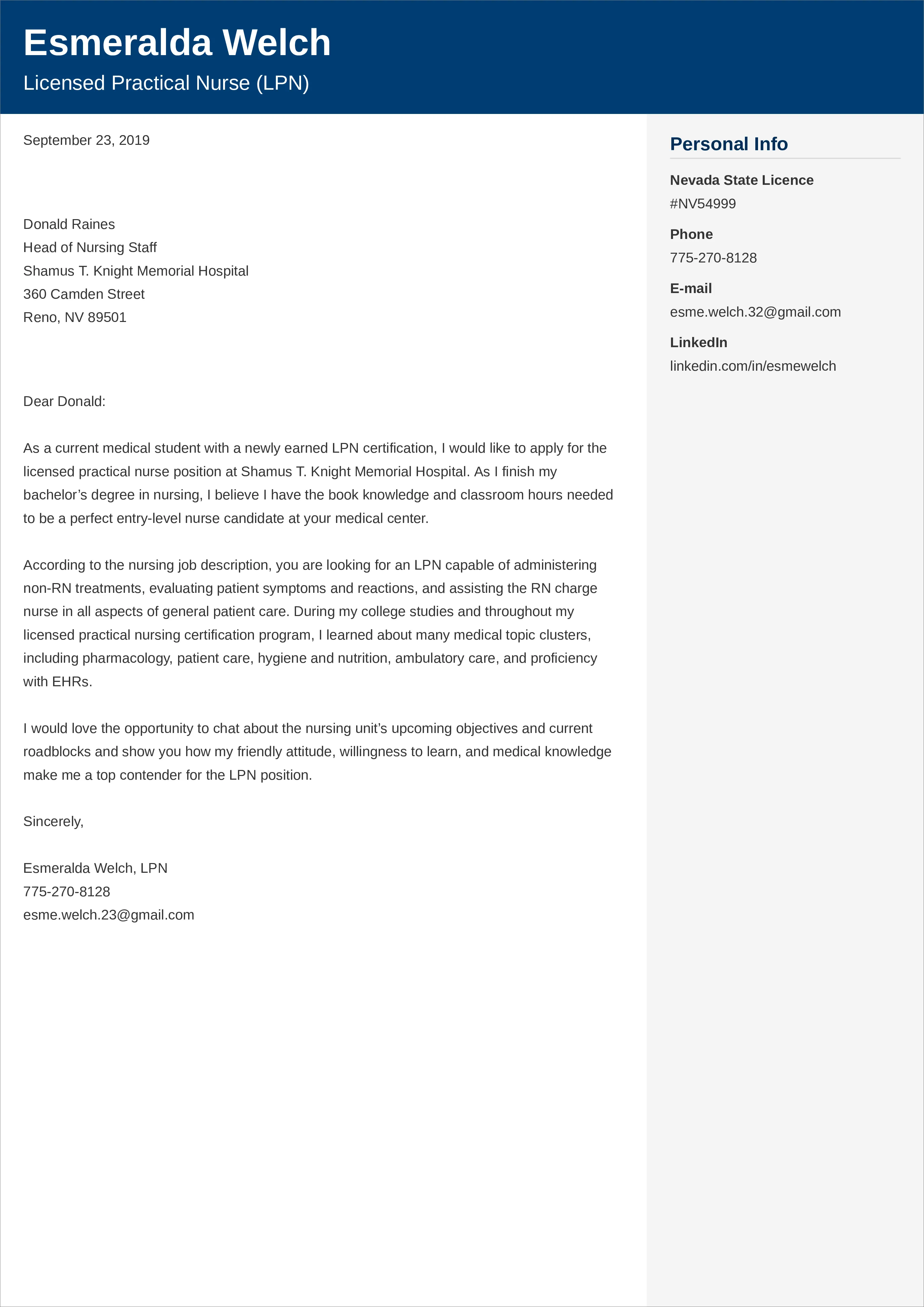
In the closing, it’s important to include a call to action. Invite the hiring manager to contact you for an interview. Reiterate your availability for an interview and provide your contact information again, making it easy for them to get in touch with you. Make sure your phone number and email address are correct, and ensure that your voicemail message is professional. End your letter with a professional closing such as “Sincerely” or “Best regards,” followed by your typed name. Always thank the hiring manager for their time and consideration, creating a positive lasting impression.
